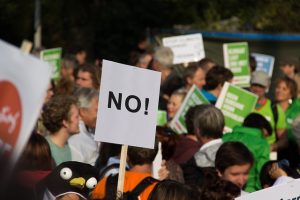And Moshe became angry with the officers of the army (31:14)
The Torah tells us the Moshe became angry at the sight of the Midianite women whom the Jewish army had kept alive. From the fact that he did not criticize the soldiers themselves, the Medrash infers that the wrongdoing of the people is attributed solely to its leaders.[1]
Can we really understand the Medrash to mean that every wrongdoing of an individual is ultimately the fault of the leaders of the generation?[2] When quoting this Medrash, Rashi adds a few words to suggest not. Rashi adds, “For they [the leaders] have the power to protest.”[3] Everyone has freewill and can always choose to act wrongly, but fault only falls on the leaders when they have an opportunity to make a difference but choose not to do so.[4]
Additionally, failing to prevent someone from sinning[5] is so terrible that the Gemora explains that such behavior resulted in the only time in history that Hashem initially intended to display goodness but then reversed His decision. Hashem initially chose to save the righteous Jews in the time of Yechezkel but decided that their fate would be with the wicked after the Attribute of Judgment approached Hashem and said that even though these people are completely righteous in every way, they failed to protest the iniquities of those around them.[6]
In fact, the Gemora does not limit responsibility to the Nation’s leaders: “Anyone who has the ability to protest against the sinful actions of those in his house and does not do so, acquires the sins of his household. On those in his city — he acquires the sins of his city; on the whole world — he acquires the sins of the whole world.”[7]
We see from here the great importance of using our position — communally, socially, religiously, or even within our family — to discourage others from acting wrongly, whereas the consequences of not fulfilling our obligation is not worth thinking about, as it says in the Medrash, “If there is no judgment (protest) below, there will be judgment above.”[8]

Rabbi Moshe Kormornick, is the best selling author of SHORT VORT, available in Jewish bookstores worldwide, as well as at Feldheim.com and on amazon.
The book contains over 340 pages of Short Vorts and stories on every Parashah, Yom Tov, and Simcha.
And it’s under $10!
Proudly published by Adir Press. To publish your book, click here

